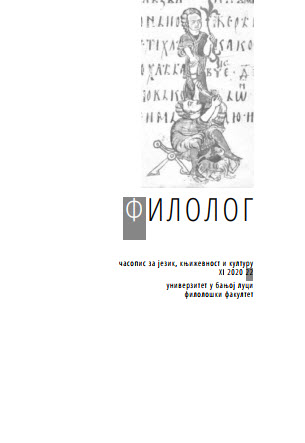СТАВОВИ УЧЕНИКА ПРЕМА УЧЕЊУ СТРАНОГ ЈЕЗИКА
DOI:
https://doi.org/10.21618/fil2022153mKljučne reči:
учење страног језика, ставови према језику, узраст, социолингвистикаApstrakt
Учење страног језика као незаобилазан чинилац обухвата социолингвистички појам ставова према језику, што уједно представља предмет истраживања овог рада. Као циљ истраживања поставља се испитивање утицаја које на формирање ставова према учењу страног језика имају узраст ученика или ставови родитеља. Уз кориштење дескриптивне научноистраживачке методе и скалирање као технику за испитивање ставова, корпус у истраживању чинили су ставови ученика узраста 9 и 13 година који похађају основну школу и уче немачки као страни језик. Имајући у виду да бројни фактори доприносе савладавању страног језика, истраживање ће показати да ли и у којој мери узраст ученика или ставови родитеља утичу на формирање ставова према учењу страног језика. Резултати истраживања могу допринети педагошкој пракси, као и освежити постојећа знања о значају ставова у настави страних језика.
Reference
Byram, Michael (1997), Teaching and Assesing Intercultural Communicative Competence, London: Multilungual Matters Ltd.
Durbaba, Olivera (2011), Teorija i praksa učenja i nastave stranih jezika, Beograd: Zavod za udžbenike i nastavna sredstva.
Gardner, Robert C. (1985), Social psychology and second language learning: The role of attitudes and motivation, London, UK: Edward Arnold.
Herrera, Antonio M., Mandić, Petar D. (1989), Obrazovanje za XXI stoljeće – od tradicije do tehnološke revolucije, Sarajevo: Svjetlost, Zavod za udžbenike i nastavna sredstva.
Klein, Wolfgang (1986), Second language acquisition, Cambridge textbooks in linguistics, London, UK: Cambridge University Press.
Krashen, Stephen (1975), „The critical period for language acquisition and its possible bases”, Development Psycholinguistics and Communication Disorders, New York: Academy of Sciences.
Krashen, Stephen (1981), Second language learning and second language acquisition, University of California, Pergamon Press, 1981.
Krashen, Stephen, and Terrell, Tracy (1983), The Natural Approach: Language Acquisition in the Classroom, University of Michigen, Pergamon Press.
Lenneberg, Erich Heinz (1967), Biological foundations of language, New York: Wiley and Sons.
Penfield, Wilder, and Roberts, Lamar (1959), Speech and Brain Mechanisms, Princeton, NJ: Princeton University Press.
Scovel, Tomas (1988), A time to speak: A psycholinguistic inquiry into the critical period of human speech, New York: Newbury House / Harper & Row.
Šuvaković, Ana (2015), Nastava italijanskog jezika kao drugog stranog jezika u ranom uzrastu, Doktorska disertacija, Beograd: Filološki fakultet, Univerzitet u Beogradu.
Vučo, Julijana (2010), „Kulturni i jezički stereotipi u stavovima mladih: Italija u jadranskom ogledalu”, Jezički sistem i upotreba jezika, Kovačević, M. (ur.), Filološkoumetnički fakultet, Skupština grada, Kragujevac, str. 351–358.
##submission.downloads##
Objavljeno
Kako citirati
Broj časopisa
Sekcija
Licenca

Ovaj rad je pod Creative Commons Aуторство-Nekomercijalno-Bez prerade 4.0 Internacionalna licenca.








